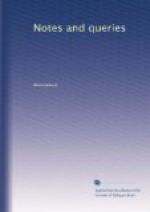It is worthy of note, that Cromwell’s fellow-trustees, the Bishop of Ely (who was the celebrated Matthew Wren), Fuller the Dean, and Wigmore the Archdeacon, were all severely handled during the Rebellion.
ARUN.
* * * * *
DR. SAM. PARR AND DR. JOHN TAYLOR, OF SHREWSBURY AND SHREWSBURY SCHOOL.
Looking at the Index to the Memoirs of Gilbert Wakefield, edit. of 1804, I saw, under the letter T., the following entries:—
“Taylor, Rev. Dr. John, Tutor of
Warrington Academy, i. 226.
—— his latinity, why
faulty, ii. 449.”
But I instantly suspected an error: for it was my belief that those two notices were designed for two distinct scholars. Accordingly, I revised both passages, and found that I was right in my conjecture. The facts are these:—In the former of the references, “The Rev. John Taylor, D.D.,” is pointed out. The other individual, of the same name, was John Taylor, LL.D., a native of Shrewsbury, and a pupil of Shrewsbury School: His latinity it is which Dr. Samuel Parr [ut supr.] characterises as faulty: and for the defects of which he endeavours, successfully or otherwise, to account. So that whosoever framed the Index has here committed an oversight.
In the quotation which I proceed to make, Parr is assigning causes of what, as I think, he truly deemed blemishes in G. Wakefield’s Latin style; and this is the language of the not unfriendly censor:—
“—None, I fear, of his [W.’s] Latin productions are wholly free from faults, which he would have been taught to avoid in our best public seminaries, and of which I have seen many glaring instances in the works of Archbishop Potter, Dr. John Taylor, Mr. Toup, and several eminent scholars now living, who were brought up in private schools.”
But could Parr mean to rank Shrewsbury School among the “private schools?” I am not old enough to recollect what it was in the times of Taylor, J., the civilian, and the editor of Demosthenes. Its celebrity, however, in our own day, and through a long term of preceding years, is confessed. Dr. Parr’s judgement in this case might be somewhat influenced by his prepossessions as an Harrovian.
N.
April, 1850.
* * * * *
PROVINCIAL WORDS.
In Twelfth Night, Act ii. Scene 3., occur the words “Sneck up,” in C. Knight’s edition, or “Snick up,” Mr. Collier’s edition. These words appear most unaccountably to have puzzled the commentators. Sir Toby Belch uses them in reply to Malvolio, as,—
Enter Malvolio.
“Mal. My masters, are you mad? or what are you? Have you no wit, manners, nor honesty, but to gabble like tinkers at this time of night? Do you make an alehouse of my lady’s house, that you squeak out your cozier’s catches without any mitigation or remorse of voice? Is there no respect of place, person, nor time, in you?
“Sir To. We did keep time, Sir, in our catches. Sneck up!”




